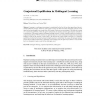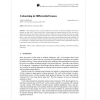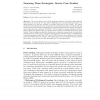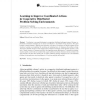ML
1998
ACM
15 years 1 months ago
1998
ACM
Abstract. Learning in a multiagent environment is complicated by the fact that as other agents learn, the environment effectively changes. Moreover, other agents’ actions are oft...
110
click to vote
ML
1998
ACM
15 years 1 months ago
1998
ACM
We review the application of statistical mechanics methods to the study of online learning of a drifting concept in the limit of large systems. The model where a feed-forward netwo...
131
click to vote
ML
1998
ACM
15 years 1 months ago
1998
ACM
Game playing has been a popular problem area for research in artificial intelligence and machine learning for many years. In almost every study of game playing and machine learnin...
155
click to vote
ML
1998
ACM
15 years 1 months ago
1998
ACM
To operate successfully in indoor environments, mobile robots must be able to localize themselves. Most current localization algorithms lack flexibility, autonomy, and often optim...
111
click to vote
ML
1998
ACM
15 years 1 months ago
1998
ACM
We use simulated soccer to study multiagent learning. Each team's players (agents) share action set and policy, but may behave di erently due to position-dependent inputs. All...
125
click to vote
ML
1998
ACM
15 years 1 months ago
1998
ACM
It is well known that prior knowledge or bias can speed up learning, at least in theory. It has proved di cult to make constructive use of prior knowledge, so that approximately c...
147
click to vote
ML
1998
ACM
15 years 1 months ago
1998
ACM
Abstract. Coordination is an essential technique in cooperative, distributed multiagent systems. However, sophisticated coordination strategies are not always cost-effective in all...
114
click to vote
ML
1998
ACM
15 years 1 months ago
1998
ACM
Following Tesauro’s work on TD-Gammon, we used a 4000 parameter feed-forward neural network to develop a competitive backgammon evaluation function. Play proceeds by a roll of t...
ML
1998
ACM
15 years 1 months ago
1998
ACM
During a project examining the use of machine learning techniques for oil spill detection, we have encountered several essential questions that we believe deserve the attention of ...
115
click to vote
ML
1998
ACM
15 years 1 months ago
1998
ACM
This paper is a case study of a machine aided knowledge discovery process within the general area of drug design. More speci cally, the paper describes a sequence of experiments in...




